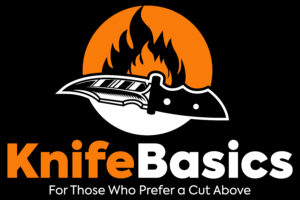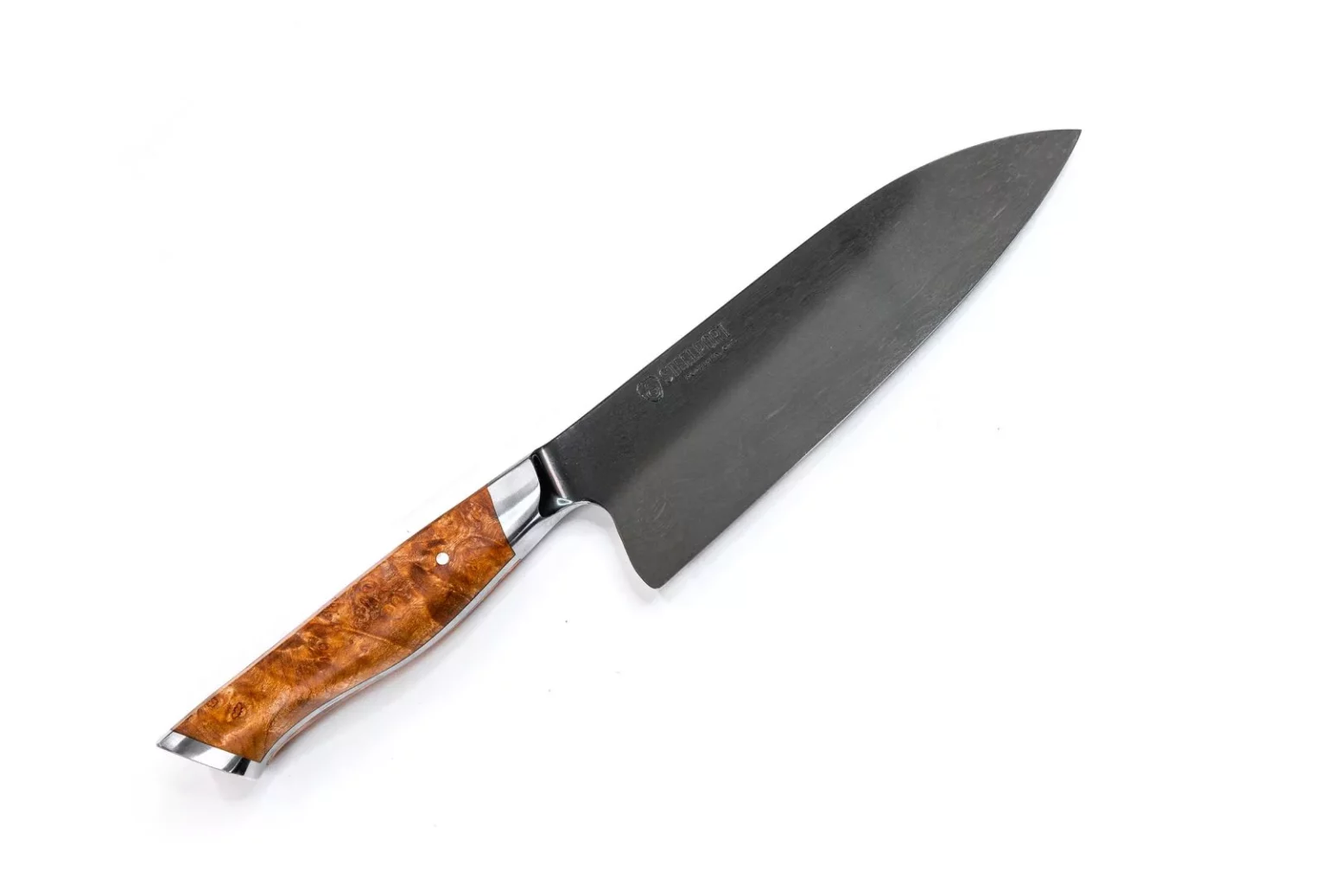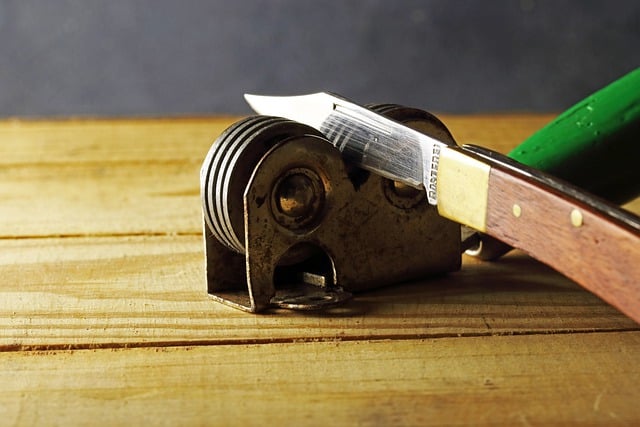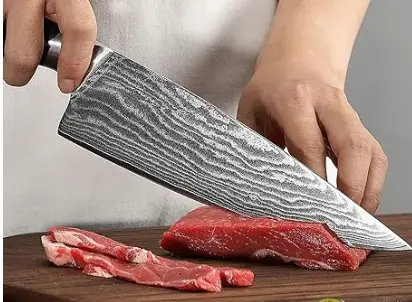Table of Contents
What is 52100 Steel?
AISI 52100 steel is a very popular steel in knife making, it has carbon and chromium as its primary elements. Because of its low alloy composition, it is categorized as simple-grade steel. 52100 carbon steel has been used to make ball bearings and knives because of its strength and wear resistance.
52100 Steel composition was later modified to make improved steel known as SR101 steel. In addition to mechanical components like ball bearings, this steel is used in the blade industry to make fixed blades, hunting knives, and kitchen knives.
52100 Steel Composition
| Component | Percentage composition |
|---|---|
| Carbon C | 0.98%-1.10% |
| Chromium Cr | 1.30%-1.60% |
| Copper Cu | 0.20%-0.30% |
| Nickel Ni | 0.30% |
| Manganese Mn | 0.25%-0.45% |
| Silicon Si | 0.15%-0.30% |
| Sulfur S | 0.03% |
| Aluminium Al | 0.05% |
| Phosphorus P | 0.02%-0.03% |
- Carbon C: Increases edge retention, hardness, and tensile strength. It also improves steel resistance to wear, abrasion, and corrosion.
- Chromium Cr: Formation of Chromium carbides. Increases the blade’s hardness, tensile strength, and corrosion resistance.
- Vanadium V: inhibits grain growth during elevated temperature processing and heat treatment, which enhances the strength and toughness of steel. It also forms carbides that increase wear resistance.
- Molybdenum Mo: increases toughness and hot hardness. It also improves hardenability and forms carbides for wear resistance.
- Phosphorous P: Considered an impurity but may Increase the strength and improve the machinability of steel
- Copper Cu: Enhances hardening properties and increases corrosion resistance of steel.
- Manganese Mn: improves the strength and hardness of steel. When the steel is heat-treated, hardenability is improved with increased manganese.
- Silicon Si: Increases strength and heat resistance.
- Sulfur S: Improves machinability but is regarded as an impurity in high quantities.
Properties of 52100 steel
Hardness
The Rockwell hardness of 52100 steel is 62-64 HRC, meaning it is very hard steel. Note that the hardness differs from the manufacturer’s heat-treating process. Carbon content is very crucial to attain this kind of hardness.
With more heat treatment at a different temperatures, some knife makers claim that this steel can get a hardness of 66HRC with low tempering temperature. The high hardness of 52100 alloy steel is due to the Carbon, manganese, and chromium mixture in its alloy.
Edge retention
The edge retention of 52100 steel is not that good, it is mostly similar to other low alloy steels like 5160 steel and 1084 steel. This is attributed to the low amount of carbides in its alloy composition.
Although it loses in edge retention to high-end modern types of steel, the hardness of this steel is enough to be used on outdoor knife needs without the need for frequent sharpening.
Toughness
52100 steel offers exceptional toughness, it is able to withstand high impact application without cracking or breaking. The toughness of 52100 on a scale of 1 to 10 is 8.5, very few steels can match the toughness of 52100 knife steel.
The toughness of 52100 carbon steel is enhanced by the presence of chromium elements that help in reducing the carbides size formed thus better resistance to chipping, fracture and cracking.
Sharpening 52100 Steel
52100 knife steel is easy to sharpen due to its good balance of edge retention, toughness and hardness. This property is enhanced by the added chromium elements which reduces the carbide size thus making it relatively.
Even without the right sharpening experience and modern sharpening tools, you should be able to get a nice edge on 52100 knives. It is not the easiest steel to sharpen out there, but you will not struggle to get an edge.
Corrosion resistance
52100 alloy steel does not contain enough amounts of chromium to make it stainless hence it does not shine in corrosion resistance.
The little amount of chromium in the 52100 blade steel composition gives it some protection against rust, but you must take care of the knife.
With that in mind, ensure to wash and dry 52100 knives after use to protect them from rusting.
Wear resistance
52100 knife steel offer good wear resistance, this is associated with the high carbon content in its composition. The addition of Chromium in the alloy helps reduction of carbide size contributing to better toughness and wear resistance.
It is because of the good wear resistance that 52100 carbon steel is used to make most mechanical components and is often referred to as bearing steel.
Using anti-wear steel in the knife industry means knives that can stand wear and tear even with frequent sharpening and hard usage.
52100 steel equivalent
AISI 52100 blade steel has impressive toughness and wear resistance. SAE 52100 steel equivalent is the Japanese SUJ2, German 1.3505, and the modified SR 101. In terms of performance, the closest 52100 steel equivalent is 5160 steel and L6 steel.
52100 steel vs 1095
| 52100 steel | 1095 steel | |
|---|---|---|
| Toughness | 8.5/10 | 4.5/10 |
| Edge Retention | 2/10 | 1.5/10 |
| Corrosion Resistance | 0.5/10 | 0/10 |
52100 steel offers better edge retention, corrosion and stain resistance than 1095 steel. 52100 steel and 1095 steel are both high carbon steels with low alloy composition and toughness suitable for making knives for tough applications. 1095 steel is however easier to sharpen and relatively cheaper.
52100 steel vs S30V
| 52100 steel | S30V steel | |
|---|---|---|
| Toughness | 8.5/10 | 4/10 |
| Edge Retention | 2/10 | 6/10 |
| Corrosion Resistance | 0.5/10 | 7.5/10 |
S30v steel is a premium stainless steel offering better corrosion resistance than 52100, which does not contain enough chromium to make it stainless steel. S30V steel also offers better edge retention and wear resistance than 52100 steel due to high volume of carbides
52100 low alloy steel is easier to sharpen and tougher than S30V steel. The toughness of 52100 is unmatched by most steels, 52100 is thus suitable for long blade that require higher toughness while S30V is most suitable for pocket knives where edge retention and corrosion is main concern.
52100 steel vs D2 steel
| 52100 steel | D2 steel | |
|---|---|---|
| Toughness | 8.5/10 | 3.5/10 |
| Edge Retention | 2/10 | 5/10 |
| Corrosion Resistance | 0.5/10 | 4.5/10 |
D2 steel is semi-stainless steel with 12% chromium content, it offers better corrosion resistance than 52100 carbon steel which contains 1.60% chromium content. Additionally, D2 steel contains more carbon content than 52100 which enables D2 blades to achieve better edge retention and wear resistance than 52100 blades.
52100 steel on the other hand offers better toughness than D2 steel. The toughness of 52100 knife steel is suitable for long blades like Katanas, swords, and tough blades like kukris. D2 is suitable for pocket knives due to its incredible edge retention and enhanced corrosion resistance.
Is 52100 a high carbon steel?
52100 steel is categorized as a high carbon steel as it contains about 1% carbon content in its alloy composition. High Carbon steels are identified by containing (0.8-1.0% C) in their alloy composition. The most notable difference between 52100 high carbon steel and other high carbon steel is its high chromium content of 1.5% Cr.
Is 52100 a stainless steel?
52100 steel is not a stainless steel as it does not contain enough amount of chromium content to be categorized as stainless steel. The chromium content in its alloy composition majorly improves the toughness, corrosion resistance and fracture resistance of 52100 high carbon steel.
Is 52100 steel good for knives?
AISI 52100 steel is a perfect choice for knives. It offers wear resistance enough to make ball bearing making it ideal for knives to be used in tough applications.
What’s more, it has great edge retention, and it is easy to sharpen. The only downside is the low corrosion resistance, but your knives will not rust with proper care and maintenance like oiling after use.
Conclusion
AISI 52100 steel has impressive toughness and wear resistance. Its equivalent is the Japanese SUJ2, German 1.3505, and the modified SR 101. The chromium addition in its alloy increases its carbide volume but reduces the carbide size leading to an excellent combination of toughness and wear resistance.
Typical applications of this steel include ball bearing, roller bearings, and knives. If you are interested in other mechanical properties like bulk modulus, machining stress, fatigue strength, etc. you will find this ASTM A295 Specification sheet useful.




